Uncluttered spaces foster calm, reduce stress, and improve emotional health. Minimalist Home Organization and Decluttering involves keeping only necessary items, creating cleaner, more organized environments that enhance daily routines and reflect personal priorities. This reduces distractions, promotes focus, saves time/energy, and positively impacts mental health by instilling control and calm, ultimately supporting better memory, decision-making, and quality of life.
Organized homes are not just aesthetically pleasing; they significantly contribute to reduced stress levels. This article explores three key aspects of how home organization and decluttering impact your mental health. From uncluttered spaces creating a sense of calm to streamlined routines that lessen daily stress, we delve into practices that foster mindfulness and long-term mental health benefits. Discover how adopting an organized lifestyle can transform your living environment into a sanctuary of tranquility.
- Uncluttered Spaces: The Foundation of Calm
- Streamlined Routines: Reducing Daily Stress
- Mindful Organization: Long-Term Mental Health Benefits
Uncluttered Spaces: The Foundation of Calm

Uncluttered spaces are the cornerstone of a calm and serene home environment, making home organization and decluttering an essential practice for stress management. When our surroundings are free from chaos and excess clutter, it creates a sense of order that promotes mental clarity. This calmness can have profound effects on our overall well-being; reduced stress levels lead to improved emotional health and better sleep quality.
A minimalist approach to home organization encourages us to embrace simplicity and only surround ourselves with what is necessary and meaningful. By letting go of unnecessary items, we create more space—both physically and mentally. This process involves intentional decisions about what to keep, donate, or recycle, resulting in a cleaner, more organized living space that reflects our priorities and enhances our daily routines.
Streamlined Routines: Reducing Daily Stress

In today’s fast-paced world, streamlined routines can significantly reduce daily stress levels. Home organization and decluttering play a pivotal role in achieving this calm. A tidy home environment minimizes distractions and promotes a sense of control, allowing individuals to focus on tasks at hand with greater clarity. When everything has its place, the time spent searching for items diminishes, leading to more efficient use of time and energy.
By implementing structured routines and keeping spaces organized, folks can navigate their homes with ease. This, in turn, reduces the mental burden associated with disarray. A well-organized home becomes a sanctuary where residents can unwind and recharge, fostering a positive mindset that carries over into other areas of life.
Mindful Organization: Long-Term Mental Health Benefits

In today’s fast-paced world, mindful organization has emerged as a powerful tool for maintaining mental health. Beyond creating visually appealing spaces, home organization and decluttering practices significantly reduce stress levels by fostering a sense of control and calm. When spaces are organized, individuals can easily locate items, streamlining daily routines and reducing the mental burden of forgotten tasks or misplaced objects.
This method goes beyond physical sorting; it involves intentionality and purpose. By thoughtfully organizing belongings, individuals can create environments that support their well-being. Research suggests that a clutter-free home contributes to improved focus, better memory retention, and enhanced decision-making abilities. As a result, mindful organization becomes a long-term strategy for promoting mental health and overall quality of life.
Organized homes can significantly contribute to reduced stress levels, as evidenced by the benefits of uncluttered spaces, streamlined routines, and mindful organization. By implementing simple home organization and decluttering techniques, individuals can create calming environments that support their mental health and overall well-being. Embracing these practices not only transforms living spaces but also fosters a sense of control and tranquility in daily life.














